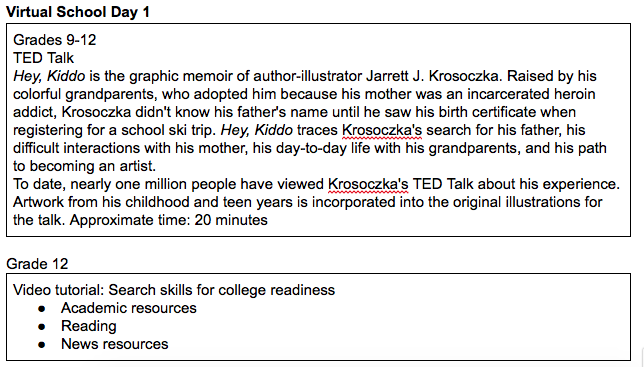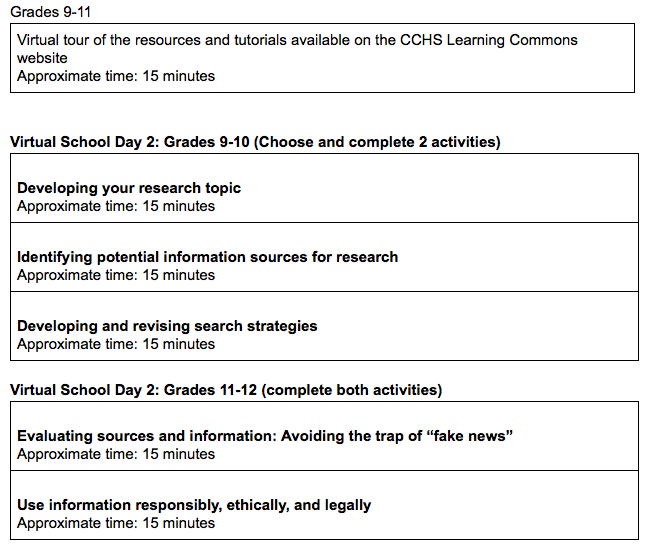Working with our IT Specialist, we are now adapting that work to serve a new need to provide an alternate digital curriculum in case of multiple snow days or other forced school closures, referred to as “virtual school days” or VSD. This article will not explain the details of our VSD plan but will instead focus on how we are conducting action research to guide the development of the pilot. The information shared here is solely from my perspective as a researcher.
Action research is defined as “a disciplined process of inquiry conducted by and for those taking the action. The primary reason for engaging in action research is to assist the “actor” in improving and/or refining his or her actions” (Sagor, 2000).
Our VSD plan is designed to accomplish the following (Sagor):
- Select a focus
- Clarify theories
- Identify the research question
- Collect data
- Analyze the data
- Report the results
- Take informed action
Focus
After seeking extensive feedback our superintendent decided that she wanted two pilot VSD lessons, and they were to be all-school assignments. This decision set the parameters for the pilot and the study.
It is important to note that the primary goal of this pilot is to gain an understanding of the mechanics of running VSDs. Is a url an effective way to share the content? Which platform gives us the best compliance data? Which platform gives us the best content acquisition data? Which platform gives us the best indicator of student engagement? Which delivery system works best for most students?
Clarify theories
DESE has given approval for districts to develop and implement virtual content in the event they have used all 5 of their snow days. DESE is clear about the need for structured learning time, and also encourage sharing best practices as this is a new endeavor for the Commonwealth.
For this approach to count toward the student learning time requirements, school districts must ensure that such work is structured learning time, is substantial, and has appropriate oversight and teacher involvement. To the degree that learning outside of the school setting may rely upon parental involvement or access to technology, districts must also account for the widely varying circumstances in students' homes. Districts are encouraged to share their experiences as they experiment with different models so that all can learn about their effectiveness and develop examples of best practices (2015).
In terms of theory, at this stage we are at the very basic “figuring it out” stage. Additional work needs to be done on research behind digital learning and effective pedagogy at the various grade levels. This will be an additional opportunity for action research for our district.
Identify the research question
We began with the research question “how do we provide digital content that students will complete and will find engaging.” The data points that we chose to focus on were:
- Delivery method - what would be the best way to push content to students on VSD?
- Compliance - how do we verify student compliance?
- Engagement - how do we gauge student engagement in al-school VSD assignments?
- Platform assessment - which platforms are most effective and which platforms provide the best experience for students?
We are a Google School and decided to use this platform because we could capture student emails to verify compliance. Under the Google umbrella, we developed two prongs of content delivery. The first was content delivery using Google Slides with embedded video tutorials and a Google Quiz to check for content acquisition and engagement. The second was Google Slides with EdPuzzle used in combination with a TEDx video. EdPuzzle allows us to embed questions during the video for students to respond.
Content
The VSD pilot is designed to evaluate the electronic delivery of VSD content, evaluate methods to assess student accountability (Google Quizzes and EdPuzzle) and to gauge student compliance and engagement. There is content for two VSD assignments.
The whole-school activity is a TED Talk by author-illustrator Jarrett J. Krosoczka, followed by a book trailer for the graphic novel Hey, Kiddo (a finalist for the 2018 National Book Award and on our 2018 summer recommended reading list).
The information literacy lessons are based on the TRAILS, the information literacy skills assessment developed by Kent State University. TRAILS is aligned with the American Association of School Libraries Framework for Learners and the Common Core Standards. The lessons also correlate to gaps identified in a curriculum review of the MA Digital Literacy and Computer Science Standards completed by our school Tech Committee in 2017. The actual VSD content was based on information literacy gaps we identified in our curriculum as the result of an in-house audit of the DLCS standards. The lessons aren’t perfect because, ideally, these skills are learned in the context of an authentic inquiry task. They are touch points.
We measured engagement with the use of Likert scales at the end of each lesson. The Likert questions focused on platform experience and whether or not the content had application to their lives or the lives of someone in their community.
Analyze the data
As we haven’t had any snow days we don’t have data to report at this time.
Report the results
We plan to report the results for the VSD content with analysis of compliance, content acquisition, and student engagement.
Take informed action
We are looking forward to implementing this pilot to see where our VSD planning goes!
Conclusion
Action research allows us to formally frame a project and collect and analyze the resulting data with integrity, and in a way that builds confidence with our administrators. It takes a little forethought but the benefits are that you can end up with an actionable plan. I look forward to sharing the data and the results of this action research once we have some snow days!
Department of Elementary and Secondary Education. (2015, February 20). Missed Snow Days, "Blizzard Bags" and "E-Learning Days"*. Retrieved January 26, 2019, from Department of Elementary and Secondary Education website: http://www.doe.mass.edu/news/news.aspx?id=16780
Department of Elementary and Secondary Education (Ed.). (2018, March 23). Additional Flexibility for Making up Lost Days. Retrieved January 25, 2019, from Digital Learning & Technology website: http://www.doe.mass.edu/ commissioner/spec-advisories/lost-days.html
Department of Elementary and Secondary Education. (2018, November 14). Science, Technology Engineering, and Mathematics (STEM) Digital Literacy and Computer Science (DLCS). Retrieved January 25, 2019, from Digital Literacy and Computer Science (DLCS) website: http://www.doe.mass.edu/stem/dlcs/ ?section=planningtools
Sagor, R. (2000). Guiding School Improvement with Action Research. Retrieved January 25, 2019, from ASCD website: http://www.ascd.org/publications/books/ 100047/chapters/What-Is-Action-Research%C2%A2.aspx



